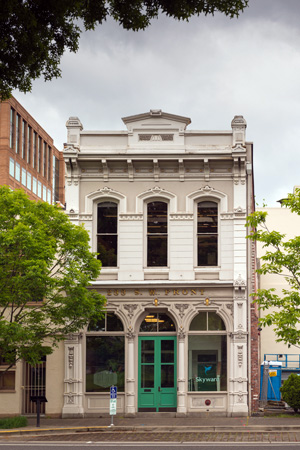Abner Hunt Francis
Page Content
 An old building on Front Street (now Naito Parkway) in Portland near the location of the mercantile business Francis operated. (Oregon Scenic Images collection)
An old building on Front Street (now Naito Parkway) in Portland near the location of the mercantile business Francis operated. (Oregon Scenic Images collection)
Abner Hunt Francis (circa 1812–1872)
In September of 1851, anti-slavery activist and successful businessman Abner Hunt Francis and his brother O. B. Francis were unsuccessfully targeted for expulsion under Oregon’s 1849 Exclusion Law. A petition drive was mounted by citizens of the Oregon Territory to allow an exemption for the family. Over 200 individuals signed the petition, which was presented to the Legislature and received a vigorous debate before being tabled.
Francis was born in New Jersey and was active in social and political initiatives to improve the lives of Blacks. Prior to immigrating to Oregon in 1851, he and his family lived in Buffalo, New York where he was a colleague of Black abolitionist Frederick Douglass. Abner wrote about his experience with Oregon’s attitudes toward Blacks in an article that appeared in Douglass’ newspaper on December 11, 1851:
Even in the so-called free territory of Oregon, the colored American citizen, though he may possess all the qualities and qualifications which make a man a good citizen, is driven out like a beast in the forest, made to sacrifice every interest dear to him, and forbidden the privilege to take the portion of the soil which the government says every citizen shall enjoy.
While in Portland Francis owned and operated a successful mercantile business at the corner of Front and Stark Streets. By 1860, Francis had amassed real estate and personal property estimated at $36,000 (equivalent to around $1 million today). In 1862, Abner and his wife Sydna Edmonia Robella Dandridge moved to British Columbia, along with 700 other Blacks who went to Vancouver Island at the invitation of Governor James Douglas. Abner was the first Black person elected to the city council of Victoria in 1865. He died in Canada in 1872.